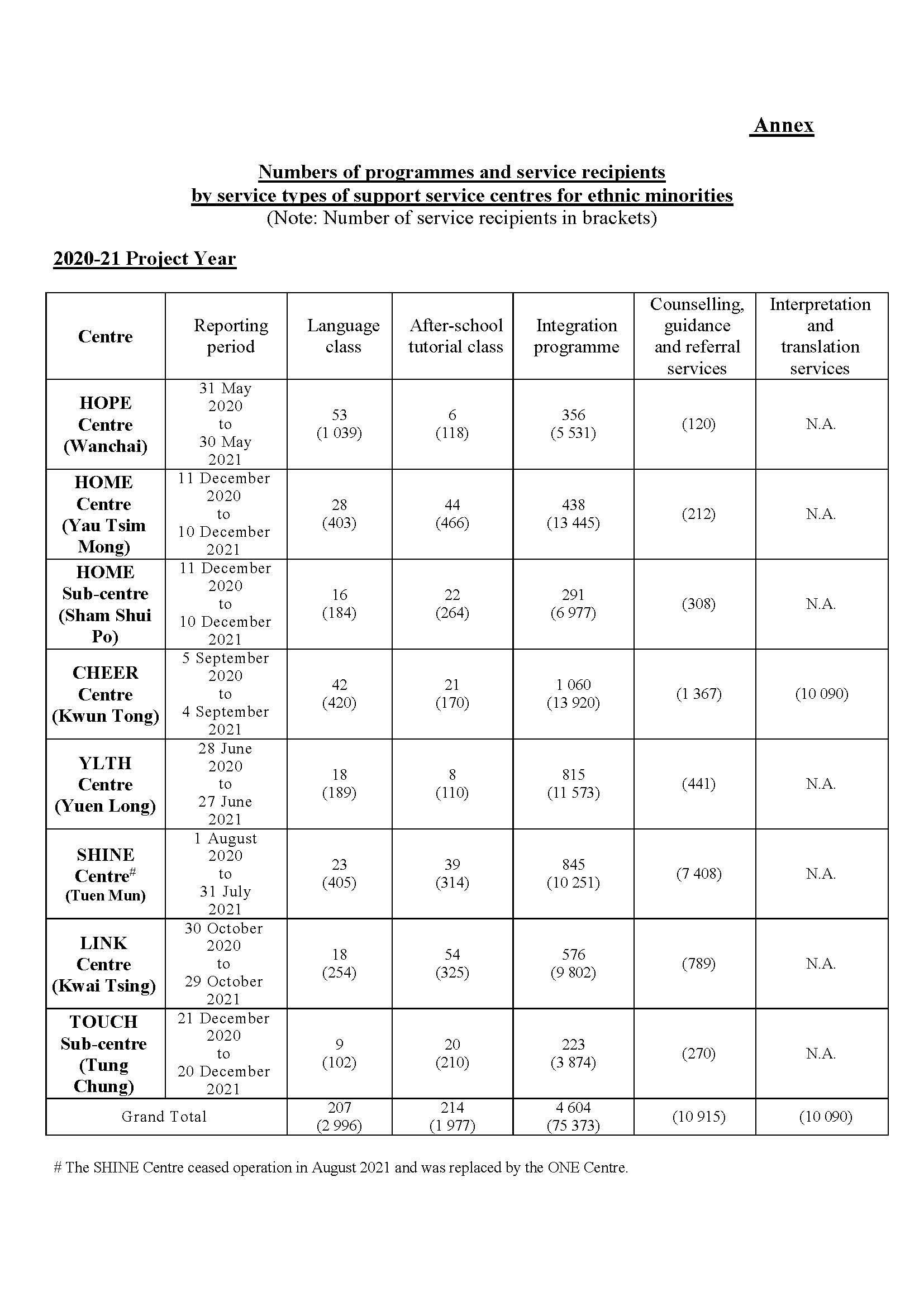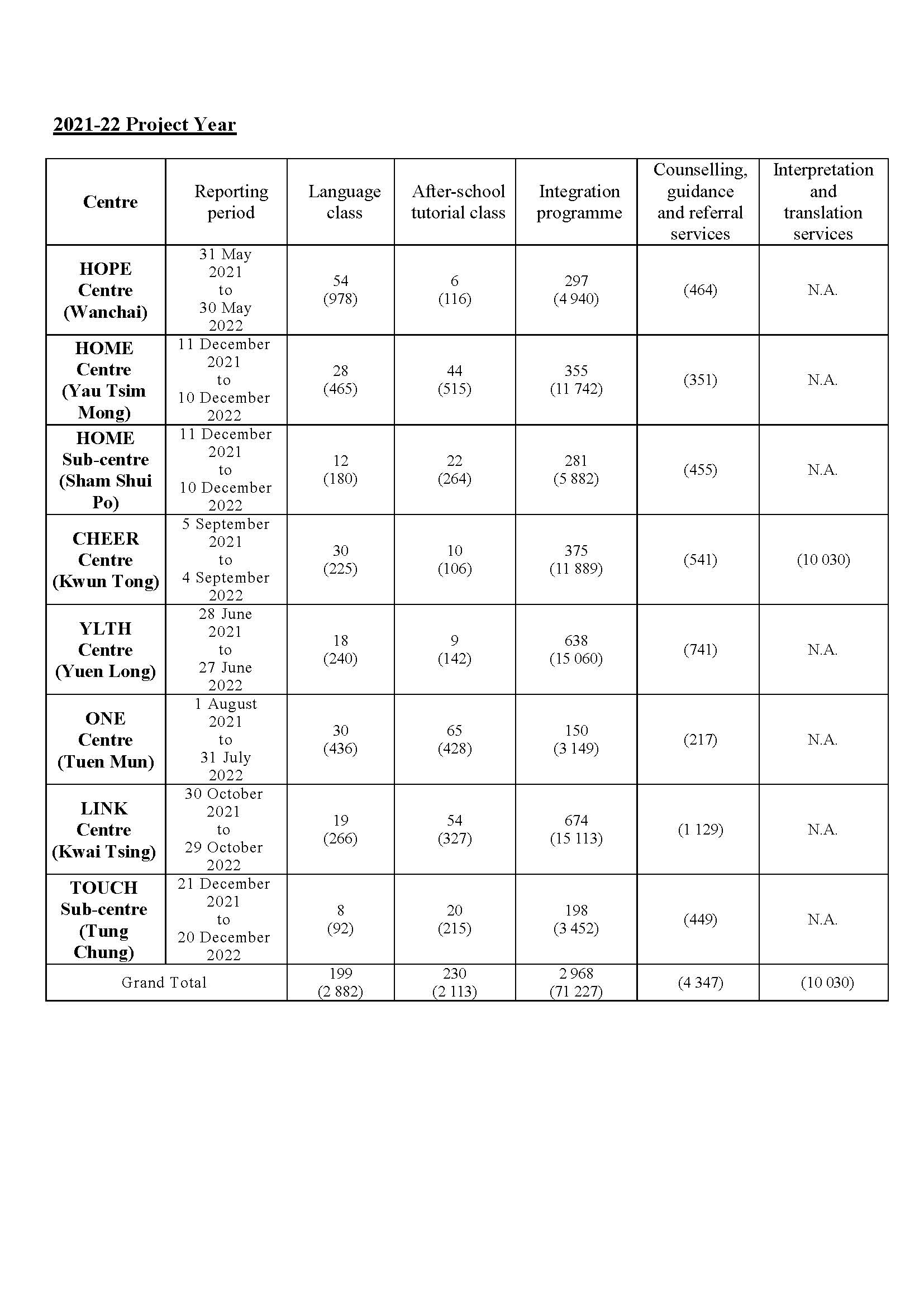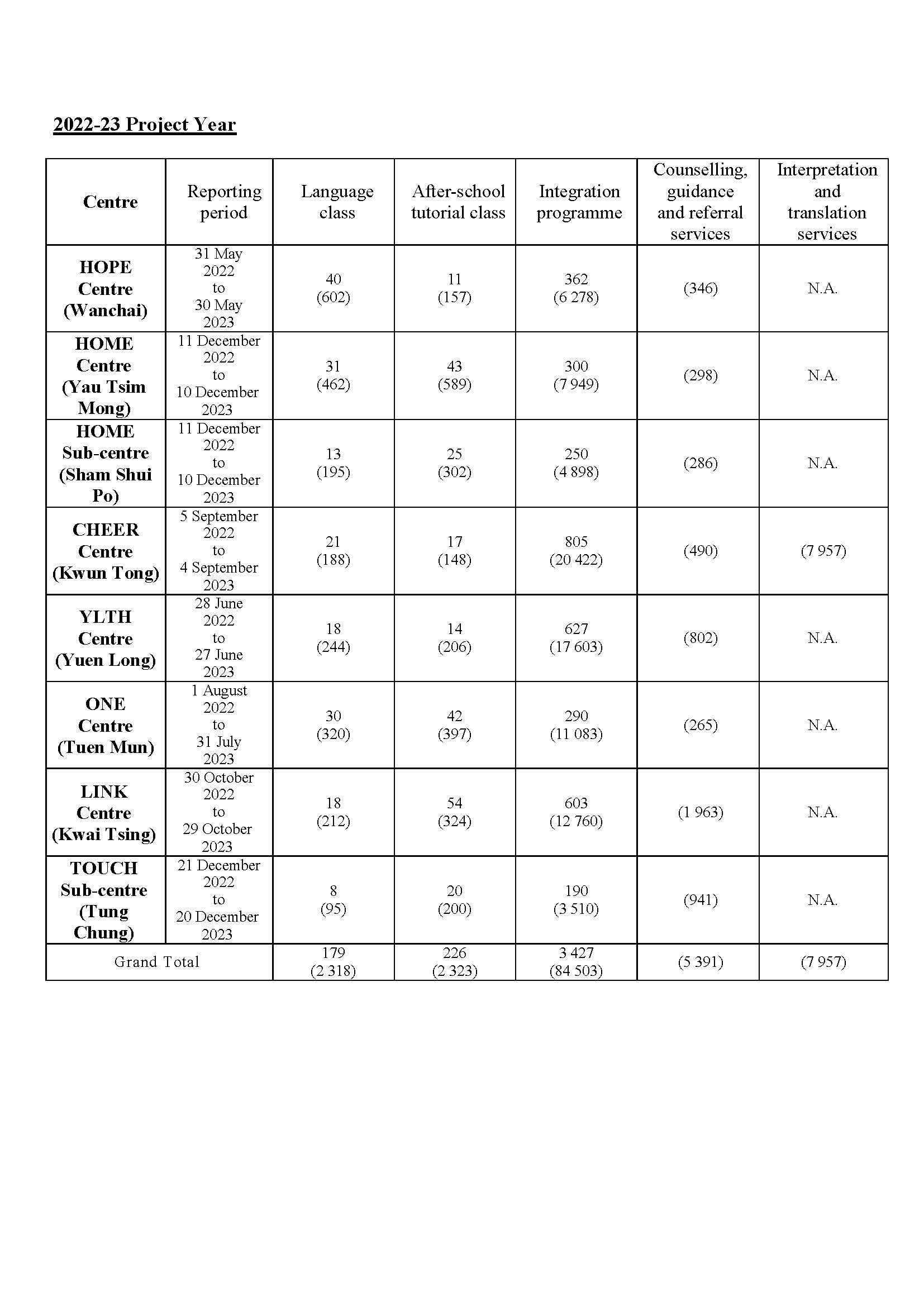LCQ6: Support service centres for ethnic minorities
Question by the Hon Chan Chun-ying :
It is learnt that the Home Affairs Department will set up two additional support service centres for ethnic minorities (EM centres) this year, bringing the total number of EM centres to 10, and invite each of the 10 EM centres to set up an Ethnic Minority Care Team (EM Care Team) to proactively reach out to ethnic minority households and residents, so as to understand their needs and introduce to them public services they require. In this connection, will the Government inform this Council:
(1) of the number of various support service items (including language classes, interest classes, and after-school tutorial classes) launched by various EM centres and the number of attendees for such activities in each of the past three years;
(2) whether the authorities have, since the Commission on Poverty conducted the Study on Ethnic Minorities’ Awareness and Satisfaction towards Selected Public Services (including integration services provided by EM centres) in 2016, collected the views of participants in activities organized by EM centres and conducted related consultation on services provided by EM centres and the way forward; if so, of the details; if not, the reasons for that;
(3) whether it has set relevant basic criteria for the establishment of the two new EM centres, such as their location and size; if so, of the details; if not, the reasons for that; and
(4) whether it has assessed if there is overlap in functions between EM Care Teams and the existing District Services and Community Care Teams, if there is room for collaborative service provision, and if there are differences in their respective selection process and monitoring mechanism?
Reply by the Secretary for Home and Youth Affairs, Miss Alice Mak:
(1) The Home Affairs Department (HAD) has commissioned non-profit-making organisations to run eight support service centres for ethnic minorities (support service centres) in Wan Chai, Yau Tsim Mong, Sham Shui Po, Kwun Tong, Yuen Long, Tuen Mun, Kwai Tsing and Tung Chung. The support service centres provide language classes, after-school tutorial classes, integration programmes (including interest classes), etc to ethnic minorities to facilitate their integration into the community. Among these centres, the CHEER Centre in Kwun Tong also provides general interpretation and translation services of English and eight ethnic minority languages (i.e. Bahasa Indonesia, Hindi, Nepali, Punjabi, Tagalog, Thai, Urdu and Vietnamese) in non-specialised/non-professional areas.
In the past three project years (2020-21 project year to 2022-23 project year), the eight support service centres provided more than 1 200 language classes and after-school tutorial classes, some 11 000 integration programmes, more than 20 600 times of counselling, guidance and referral services, as well as some 28 000 times of interpretation and translation services, benefitting about 294 400 service recipients. The numbers of programmes and service recipients of the support service centres by service types are set out in Annex.
(2) The support service centres have all along collected views and feedbacks from service users and other stakeholders through various means, including questionnaires, opinion collection boxes, focus groups, meetings with stakeholders, to ensure that the support service centres can provide services that meet the needs of ethnic minorities.
(3) According to the 2021 Population Census, the ethnic minority population in Hong Kong has been increasing over the years. Excluding foreign domestic helpers, there are about 301 000 ethnic minorities, representing an increase of over 50 per cent as compared to the 2011 Population Census. Taking into consideration of the population statistics and views from stakeholders, the two new support service centres will be set up in Kowloon Central (covering Kowloon City and Wong Tai Sin) and New Territories East (covering Sai Kung and Tseung Kwan O). The HAD is openly inviting eligible non-profit-making organisations to submit proposals to apply for funding to establish and operate the two new centres. The organisations are required to submit proposals with details including centre area, facilities, services and activity plans based on their experience and understanding of the needs of ethnic minorities for consideration by the HAD.
(4) The service recipients of District Services and Community Care Teams (Care Teams) in 18 districts include ethnic minorities. However, due to language and culture differences with ethnic minorities, the HAD will set up one Ethnic Minority Care Team (EM Care Team) mainly constituted by ethnic minorities in each of the support service centres to better serve ethnic minorities. The EM Care Teams are expected to commence their services within this year. The EM Care Teams will collaborate with the District Offices and Care Teams in the 18 districts. When Care Teams encounter difficulties in serving ethnic minorities, they can refer the cases to EM Care Teams for follow-up actions. The EM Care Teams will also provide assistance to affected ethnic minorities in cases of accidents, emergencies or disastrous events.
The support service centres have already established a good network with ethnic minority communities as well as different government departments and organisations, and have ample experience in serving ethnic minorities. Compared with openly inviting applications from other eligible organisations, setting up EM Care Teams in the support service centres can consolidate and make more effective use of existing resources to serve ethnic minorities.
Each EM Care Team shall comply with the guidelines and requirements issued by the HAD and are required to submit progress reports to the HAD regularly. The annual financial report of the support service centre must be audited by an independent certified public accountant. The HAD will closely monitor the operation of the EM Care Teams, including examining the progress reports submitted by the operating organisations, conducting inspection or attending relevant activities/services to evaluate the service effectiveness, and regularly reviewing the work progress and performance with the operating organisations. The relevant arrangements are generally similar to those for the Care Teams.



